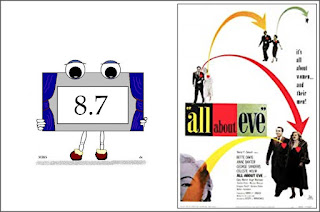All About Eve
Genre: psychological drama (in black and
white)
With: Bette
Davis (Margo Channing), Anne Baxter (Eve Harrington), George Sanders (Addison
DeWitt), Celeste Holm (Karen Richards), Gary Merrill (Bill Simpson), Hugh Marlowe
(Lloyd Richards), Gregory Ratoff (Max Fabian), Barbara Bates (Phoebe), Marilyn
Monroe (Miss Casswell), Thelma Ritter (Birdie Coonan)
Director: Joseph
L. Mankiewicz
Screenplay: Joseph
L. Mankiewicz (based on a story by Mary Orr)
Release: 1950
Studio: Twentieth
Century Fox
Rating: PG
MBiS score: 8.7/10
‟Fasten your seatbelts, it's going to be a bumpy night!”
QuickView
Story-line: on this glamorous evening, the Sarah Siddons Society, arbiter of the theatrical world, has chosen to bestow its Award for Distinguished Achievement to-o-o-o… Eve Harrington! The announcement draws admiration and applause from almost all in attendance, but not from those closest to Eve on a personal or professional basis. If you don’t understand their hostility, just ask Addison DeWitt, the well-known critic. He will tell you all about Eve…
Pluses: fabulous acting by a star-studded cast (it would be unfair to single out
one actor or another, so indispensable is everyone’s contribution), an astute
and airtight screenplay steeped in character psychology and rich in humorous and
gloriously sarcastic dialogues, masterful direction by a top helmer, appropriate
production values, fine musical accompaniment and a tremendous denouement.
Minuses:
none. It’s an easy task for me to review pictures as great as this one.
Comments: considering its world-class acting, brilliant story told with panache, ambiguous characters who need to be needed and unanimous acclaim in filmdom (Best Movie Oscar; Jury Prize and Best Actress [Bette Davis] in Cannes), ALL ABOUT EVE is indeed a classic and a must-see for movie buffs. How wicked is it? Try to imagine the theatre as a fancier form of roller derby.
MBiS
© 2021 – All rights reserved




















